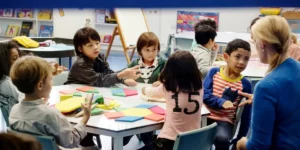“If children can learn without screens in Finland’s top-performing schools, maybe the youngest learners don’t need them either.”
In a bold move that’s making headlines across the globe, Finland has officially banned smartphones in schools for students aged 7 to 16. Starting August 1, 2025, mobile devices can only be used during the school day with explicit teacher permission – for educational tasks or health-related reasons. If a phone becomes disruptive, teachers have the right to confiscate it.
This decision isn’t based on impulse – Finland, often hailed as a global leader in education, took this step after growing concerns about the negative impact of screen time on student focus, learning outcomes, and overall well-being.
But here’s a critical question:
What can preschools and early childhood educators learn from this?
Why Finland Did It: A Wake-Up Call for Educators Worldwide
Finland’s government was alarmed by new research showing rising digital distractions in the classroom. In recent PISA assessments, Finnish students reported higher levels of distraction – 41% said phones interrupted their focus in math classes.
This concern comes amid a broader shift: teachers have been witnessing shorter attention spans, reduced peer interaction, and a spike in screen-related anxiety. Education leaders decided it was time to take action.
The new legislation enforces consistent rules across the country. Municipalities like Tampere have gone a step further, banning phone use during breaks inside school buildings.
It’s not just about better test scores – it’s about protecting mental health, restoring social learning, and bringing joy back into education.
Finland Isn’t Alone: A Global Movement Is Brewing
Countries like France, Denmark, Belgium, and Norway have already placed bans or strict limits on smartphone use during school hours.
Educators worldwide are asking:
Are we overestimating the educational value of screens?
Are we underestimating the power of real, human connection?
What About Preschoolers? They’re Not Immune
While Finland’s new law applies to students in formal schooling (age 7+), the implications for early childhood education are undeniable.
Here’s why:
1. Children Are Exposed to Screens Too Early
Many toddlers and preschoolers are already spending hours on tablets and phones at home. Studies show this can delay speech, reduce attention span, and impact emotional regulation.
2. Preschool Is About People, Not Pixels
Early education should be rooted in play-based learning, social interaction, and emotional development. None of these require screens – and in fact, screens can get in the way.
This is why many progressive early years curriculum today – like We Skoolhouse, which draws inspiration from the Reggio Emilia approach – are intentionally designing sensorial, screen-free environments where children lead their own learning through discovery, dialogue, and creativity.
3. Boundaries Start Early
Preschools have a powerful opportunity to model healthy screen habits. A “no phones during school hours” policy, extended to staff and parents, can create a culture where children learn to value face-to-face interaction from the start.
What Can Preschools Do? Practical Ideas for a Screen-Free Start
- Build a Phone-Free Policy
Set clear expectations for staff, parents, and visitors. Encourage them to keep devices away during drop-offs, pickups, and classroom interactions.
- Create Engaging, Sensory-Rich Environments
Let children learn through touch, movement, nature, stories, and conversation—not through glowing screens.
- Partner with Parents
Help families become aware of screen-time recommendations from the WHO and pediatricians. Offer alternatives: storybook reading time, puzzle play, or simply talking during meals.
- Lead by Example
When children see adults prioritizing real interactions over screens, they copy. Teachers who are fully present inspire children to be the same.
Final Thoughts: Early Habits, Lasting Impact
Finland’s ban on smartphones isn’t just about managing gadgets, it’s about protecting the sanctity of learning. And while preschools may not be bound by the same laws, they carry the same responsibility.By creating screen-free sanctuaries, preschools can ensure that childhood remains a time of wonder, movement, laughter, and learning. Because the most powerful app a child can open… is their imagination.





